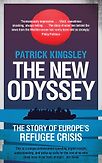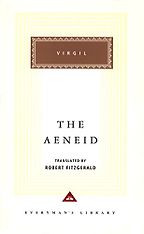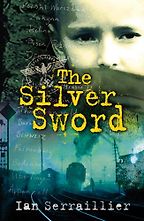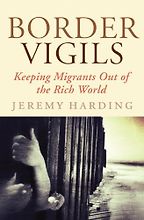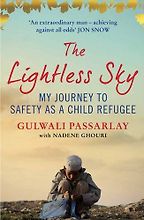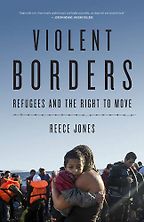We’re talking about books about refugees. Do you want to tell me your first choice?
The first book I’ve chosen, The Aeneid by Virgil, is an icon of the western literary canon. Not everyone would see it as a text about refugees but, for me, the central narrative is about a refugee called Aeneas, after whom the series of books is named. For some people, he’s a classical hero who sets up a new dynasty after fleeing Troy. Another way of interpreting it is that he is a refugee that flees a war in the Middle East, sails across the Mediterranean, and eventually, after a lot of difficulties and battles, ends up in Italy where he founds the dynasty that will later create the Roman Empire.
It’s very interesting that you compare a classical epic to refugees’ experience.
Yes, I wanted to make this point because, in the European discourse, we sometimes forget that many of us are linked, in some way, to people that have had to move across countries or continents. I certainly am. We forget that many of the classics of our literary canon, like the Aeneid or the Odyssey, are about people on the move — either refugees or migrants. In the Bible, Jesus is an economic migrant when he’s born in Bethlehem and then quickly he turns into a refugee because he has to escape to Egypt.
I like the Aeneid because it is a gripping story about someone who is escaping from a war and is searching for a better life, but I also think it’s an important text to bear in mind in discussions about refugees because it reminds us that so many books and cultural references in Western culture are about refugees and human flight. Human movement has always been a key part of our history and our culture and it is important to remember this in times when people are so wary of welcoming people who’ve come from other lands.
I didn’t have a chance to read the book, but I read a little about it. It is very interesting.
It’s a book I read at school. I love the poetry in it. Just as a work of literature, it is very beautiful. Some of the images from it are ones that still affect me, even ten years after I read it. For example, there is a scene as Aeneas, the main character, leaves Troy and he has with him, holding his hand, his son, and his old father is on his back. I remember being on the island of Lesbos and seeing a Syrian dad with his little son in his hand and another child on his back. It reminded me of this scene of Aeneas also being on the move. This is one of the comparisons that made me reinterpret the Aeneid as a book about a refugee rather than just a classical epic that is a big part of Western literature but nothing more.
What’s book no. 2 on your list of books about the refugee experience?
My next book is The Silver Sword, by Ian Serraillier. This is a book that I read as an eight-year-old. It’s a story about a group of children who are displaced in Europe in the aftermath of World War II. Like the Aeneid, this is first and foremost a gripping yarn about some people on the move, and it’s exciting, it’s moving. They’ve lost their parents and are trying to find them. There’s a lot at stake. I remember being gripped by this book and not being able to put it down.
Where does it take place?
It takes place in Central Europe in the aftermath of World War II. Europe was in complete chaos. You had armies on the march throughout the continent, people who had fled because of the war. You had 12-14 million people displaced at that time. I think a book like The Silver Sword is a useful reminder that Europeans, in our very recent past, have been displaced, have been turned into refugees and been involved in a refugee crisis far greater than the one that we are in now.
“If you have borders, you’re always going to have people trying to get round them.”
That crisis was solved by a European continent that was far weaker than it is now. So as well as being a great story, The Silver Sword reminds us that in Europe’s own recent past, Europeans have been refugees themselves. Many more of them, in fact, than are coming to Europe today. We were able to find solutions to this much bigger crisis in a context where we had far fewer resources. That’s why I’ve included this book in the list — because it is an important reminder of how Europeans really aren’t that different to people coming to Europe today by boat or walking across the Balkans.
You said that with fewer resources, Europeans were able to find solutions to the refugee problem that happened after World War II. What’s different now? Why is there still a problem while Europe is much stronger and has more resources? Shouldn’t it be easier?
The first thing is that we’ve forgotten that we were once in the same position, and that we were able to deal with big flows of people in a relatively short space of time. People don’t feel an ethical need to get involved because our memories of history are quite short. I think there’s also a difference between the situation now and the situation then, which is that the people who were displaced within Europe then were themselves Europeans, whereas the people who came to Europe last year are not from Europe and, therefore, there’s a fear factor and a wariness. And, resulting from that, there’s a feeling among some people, for example here in Hungary, that this is not Europe’s problem and that Europe shouldn’t be having to deal with this issue in the way that it felt motivated, in late 40s and the early 50s, in response to 12-14 million people being displaced within Europe at that particular time.
We’re at no. 3 on your list of refugee books. Tell me which one it is.
The next book that I’ve chosen is The Uninvited by Jeremy Harding. This is a book that was written in the late 90s about the people coming to Europe at that time and the people who were transporting those refugees at that time. As a journalist covering a similar theme nearly twenty years on, I find common purpose with the author, Jeremy Harding, because he was interested in the same things that I’m interested in. I’m researching the same themes and practices that he was researching twenty years ago. It is fascinating to read an in-depth piece of investigative reporting from a different era.
“He is a brilliant writer, and a big thinker on the subject of migration and its implications for western policy.”
There are these fascinating passages about how smuggling between Albania and Italy works. For me, this is intriguing because I’ve spent a lot of time talking to smugglers in Libya and Egypt and Turkey and Niger. So to read about smugglers in another context, and how they function in the Adriatic Sea between the Balkans and south-eastern Italy, is fascinating.
It is not just a book about the mechanics of migration, it is also a beautiful text. He is a brilliant writer, and a big thinker on the subject of migration and its implications for western policy. There’s a very elegiac passage where he talks about the ethics of smuggling. He takes on the idea that traffickers or smugglers are evil or the cause of migration as Western governments like to present them. He has this very beautiful piece of analysis where he says, ‘Human traffickers are simply vectors of the contempt which exists at the two poles of the asylum seeker’s journey; they take their cue from the attitudes of warlords and dictators, on the one hand, and, on the other, of wealthy states whose citizens have learned to think of generosity as a vice.’ So, basically, he’s saying, in a very deft way, that the brutality and the cruelty that some smugglers exhibit is simply a symptom of wider cruelties within the places where refugees are coming from and also in the countries where they are travelling to.
There’s a very interesting passage in this book. It says, “It has been suggested that the business of illegal migrant trafficking, worldwide, is worth between 5 and 7 billion dollars a year.” That’s a huge amount of money. Do you think there’s a solution for this trafficking business?
For me, if you have borders, you’re always going to have people trying to get round them. When you have people trying to get round them, you’re always going to have people who are going to provide a paid service to smuggle you across those borders. As a result, no, you’re not going to be able to get rid of people smuggling.
Get the weekly Five Books newsletter
Personally, I feel one way of undercutting the smuggling business is to provide a system of legal access to countries like Britain. If you provide a legal route, or if you provide a realistic prospect of formal resettlement from, say, Turkey to Britain, then it makes it less likely that people would put their lives in the hands of smugglers. This is one way of bringing down the reliance on the smuggling business. We need to change the paradigm in the way that we think about migration and about refugees.
In what sense?
At the moment, we think of migrants or refugees as people that need to be kept out. We don’t think about what the benefits could be of extending our hands to other human beings, not just for humanitarian reasons, but for practical reasons.
Can you name a couple?
Refugees are workers, they are academics, they are mechanics, they are engineers, translators, journalists, tailors. Whoever they are and whatever qualifications they have, they have, nevertheless, something to offer. They can be of economic benefit to the country that they are arriving in. For me, it is not enough just to think about how we crack down on people smuggling. To decrease people smuggling, we have to completely rethink the way that we conceive of human migration. We need to think of it as something that can be of economic benefit to everyone — both the people that are coming and the people that are receiving them.
“We need to change the paradigm in the way that we think about migration and about refugees.”
In Western societies, we have decreasing populations. We have a working-age population that is getting smaller, and a retirement population that is getting bigger. There are more people to care for and there are fewer people to care for them and to pay the taxes that are needed to pay for the institutions that look after people in their old age. For that reason, people from other parts of the world can be a solution to this kind of challenge. Once we start to think in those kinds of terms, that will lead to Western countries making it easier for people to cross borders and, in
But, obviously, in the current climate, with Trump on the rise, with Marine Le Pen on the rise, with Viktor Orban on the rise in Europe, and UKIP in the UK, we are a long way from the ideas that I’ve just set out. But if people are genuinely interested in cutting down smuggling, then personally I find it a bit disingenuous to talk in terms of arresting smugglers, or smugglers being the cause of migration. Smugglers are the side-effect, and the smuggling business that he says is worth between 5 and 7 billion dollars, is a side-effect of Western policy and Western thinking about human movement.
It’s also interesting that he says in the book that, “In the early 90s, about 80 million people, 1.5% of the world population, were living outside the country of their birth.”
For me, that’s not actually that many if you think about it. That number is a bit higher now, in fact it is probably several times bigger than 80 million. Either way, for me, the fact that tens of millions or hundreds of millions of people are living outside the country of their birth is not something that should alarm us. It’s still a small fraction of the world’s 7 billion population. I think some people might read that and think, ‘Gosh, that’s a big number.’ But, in fact, it is a small number that should be very easy for other countries to deal with. If you have 80 million people within a population of 7 billion, this is a small fraction.
He also differentiates between refugees and migrants. On what basis can one say whether someone is a refugee or a migrant?
There is this whole debate at the moment about what we should call people who are on the move. Personally, I feel that anyone who’s on the move should be described as a migrant because migrant should be a neutral term that describes the act of movement, rather than the intention of the person who’s moving. So a migrant could be someone who’s fleeing a war, it could be someone that’s fleeing persecution, or it could just be someone who is trying to get a better job. There doesn’t have to be a stigma attached to the description, ‘migrant.’
“Movement can be a benefit to everyone if it is managed properly.”
But there are other people who feel that migrant has become a dirty word, and, therefore, we need to refer to people on the move as refugees. I think that’s linguistically a bit problematic because when you see a group of people on the move, there’s no way of knowing exactly what their background is or what their motivations are, and so it is better just to refer to them with a word that describes their actions rather than their intentions.
I think, also, the minute you start differentiating between refugees and migrants in everyday speech, you start to create a two-track process of sympathy. You start to assume that there is no good reason to be on the move unless you are fleeing a war. Now, people fleeing wars are among the people that need the most amount of help in the world, but there are also many other valid reasons to be moving from place to place. I think we should avoid getting in a situation where we are basically saying, ‘You only have the right to move if your house has literally been bombed yesterday.’ I think we need to move more towards a situation where we recognise that there are lots of valid reasons to move and that that movement can be a benefit to everyone if it is managed properly.
In the future, in the decades to come, there’s going to be a lot more movement because of climate change and the cuts to resources that climate change will precipitate. Because of this, we need to be more open minded about people moving. If it is going to happen more and more, we need to be less prescriptive about who can move because it is going to happen whether we like it or not.
What’s next in your refugee book reading list?
The next book is The Lightless Sky, by Gulwali Passarlay. Gulwali is an Afghan in his early twenties who, like you, recently came to Britain. Like you, he is a deeply impressive person who undertook an extraordinary journey from a war zone in which he was at risk.
He came across Pakistan, Iran, Turkey, Bulgaria, he was sent back to Turkey, then he came to Greece, then he went to Italy, and then France, and finally to Calais, and Britain. It is just an astonishing journey that’s made all the more extraordinary by the fact that he was 12 or 13 when he made this journey on his own.
That must have been very scary for him.
I think it was terrifying. He was dealing with smugglers. He was on ships that were sinking in storms. He was stuck in little recesses of compartments on trains. He spent time in detention centres in Italy. He did all this when he was not yet a teenager — or just on the cusp of being a teenager. Finally, once he gets to Britain, he comes up against all the bureaucratic obstacles that the British system places in front of refugees and asylum seekers.
It is the only book in this list that is written by a refugee and gives a first hand account of what it is like to have to flee your home and to move across so many different and dangerous contexts to find another home. For that reason, this is the most essential book in this list of five because it is the only one that tells you, in the words of a refugee, what it is like to be a refugee. It’s such a powerful text. There are so many moving scenes, like when he’s on a boat in the middle of the Aegean and is hit by a smuggler — or when he is trying to get from Northern France to Britain. Perhaps the most moving scene is—he’s been separated, at the beginning of his journey, from his brother and he’s been hoping to bump into his brother at some point on his travels—
Why was he separated from his brother?
The smuggler just separates them very quickly, despite promising his family that they would stay together. They are put on different planes from Pakistan to Iran. So, very early on in the journey, he is separated from his brother, and then, when he is in Greece, several months and several countries later, he suddenly comes across people that recognise his face, because they’ve seen his brother several weeks or several months previously. It is such a moving moment when you realise there’s a chance that he will see his brother again.
I read a review about this book and Gulwali says that when he arrived in the UK, the Home Office didn’t believe that he was 13 years old. I find that interesting because when I arrived here myself, there was an Afghani guy who said that he was 15 years old, and they didn’t believe him either. Is it a thing for the authorities not to believe people when they say that they’re underage, so that they don’t allow them to apply for family reunion later? Or is it like, ‘You came to this country by deceit so we’re not going to believe you’? How do you see it?
As you say, when Gulwali gets to Britain, they don’t believe he is as young as he says he is. Some people might argue that that’s the prerogative of the British government, the prerogative of any government who’s receiving asylum applicants. They need to have proof of who people are and how old they are and who their families members are before they can talk about giving them asylum or resettling their family from overseas.
The flip side is that perhaps governments, particularly the British government, are trying to discourage people from coming and are trying to make it as hard as possible for people to live a normal life in Britain and to claim the asylum that they are rightfully allowed by international law and by the treaties that we came up with in the aftermath of World War II. Asylum officials are consistently trying to find ways to slow down—or even block entirely—people’s applications so that more people aren’t encouraged to come in their wake, or so that they can’t bring their families over.
If you say that an Afghan is older than he is, then it is easier for you to send him back because he is not a child, and it is harder for him to bring his family over because you lose that right once you reach adulthood.
So some might say that it’s the prerogative of government to be this cynical because they have to have some level of process. The counterargument is that they are perhaps being unnecessarily obstreperous and are disregarding the rights and the needs of people who are in very vulnerable situations and are fleeing genuine danger, and who need all the understanding and support they can get.
We’re at the last one on your list of refugee books. Tell me about your final choice.
The final book is called Violent Borders (2016), by Reece Jones. This book looks at border policies all over the world, and in places that I haven’t myself reported from, such as the Mexican border with the US. It’s also a history of the border and it makes a powerful case for how borders are essentially a construct, something that we’ve invented only fairly recently in human history, and it shows how it is a deeply problematic construct.
Personally, I try not to get too involved in the debate about open borders or the philosophical discussions about nation states and so on, but I think it is very useful to read a book like Violent Borders because it makes us rethink our understanding of how the world and how different countries all fit together. He reminds us that our configuration of the global order is only a recent one and one that isn’t particularly perfect.
And is manmade. For me, coming from an English literature background, whenever I think of borders, Robert Frost’s poem “Mending Wall” comes to mind: “Something there is that doesn’t love a wall.” Is there anything else you’d like to add about Violent Borders?
At its heart, it’s an analysis of what a border between two countries is, but it also says how borders haven’t always been as fixed as they are now, and haven’t always been as militarised as they are now. In previous centuries and eras, we’ve had different conceptions of the role of the state. We haven’t always had the same ideas about property or sovereignty.
In the process, he provides an alternative history of human movement, and he connects the dots between many of the world’s different migration crises. He basically presents it as a crisis of the world order. The way we have configured nation states in the 21st century is unfair, and, moreover, has created many of the problems that surround migration at the moment. Intellectually, it is a very important book that provides a different vision of where we are today. I recommend it to anyone that is interested in refugees or in migration or in the role of the state.
Can you tell us a little bit about the refugees. What is it like for them on the road?
You tell me!
But you’ve worked closely with refugees. What is it like for them dealing with borders all the time?
I can talk about how I felt walking with refugees as they crossed borders, which I did a few times. The way that I see it is that, for many refugees, walking across Europe or walking across different borders is a bit like a miner in the 19th century who is only able to see the little bits of the mineshaft on which his head torch shines. It is like being in a pitch dark room and you’re only got a torch to see with and you can only see the little bit of the wall that the torch is shining on, at that particular moment.
If people are walking across the Serbian-Hungarian border, they are reliant on little snatches of internet they have from Wi-Fi hotspots in cafes, in hotels, and that comes and goes. From the little snatches of internet, maybe people get messages about the best way to go or they can check the Facebook group which has directions about the best routes to take. The mental picture that they have of their route is very different to that of a local or someone who’s lived in Europe all their lives because they’re coming to Europe for the first time. They don’t really understand how the continent fits together. It’s like a short-sighted person walking without their glasses. Nothing is in focus and everything seems a little bit confusing.
The miner image is such a great image.
In our minds, the border is a big deal: it is the division between two countries or two cultures. But when you get down to it, and you actually cross a border, you realise that it’s just a little stretch of land that doesn’t have any demarcations on it. It doesn’t tell you when you’ve moved from one place to the next. As a result, it feels quite underwhelming. It makes you question whether these borders that we build up in our minds are really as significant as some of us make out.
The only way you know you’ve crossed the border is by looking at the GPS and you see that the little blue dot that marks where you are has moved from one side of the little black line to the other. But when you are in the real world, that black line isn’t marked on the ground, and there is little difference between the field that is supposedly in one country and the field that is supposedly in another country. I’m sure you remember the walk between Serbia and Croatia, that there is little difference between the farmland in Serbia and the farmland in Croatia.
I went from Serbia to Hungary. I didn’t go to Croatia. At that time, the road was open.
When did you cross?
I crossed in 2015, in June. At that time, there was nothing on that border. They hadn’t built the fence yet.
Exactly. So I don’t know how you remember it, but I remember walking with a group of people in June, and I was struck by how there was no physical gap between the two countries. There was just a single continuous space.
The other, final point I want to make is that in the context of different countries being hard distinguish from each other, where everything is very confusing because you only have limited access to the internet, and where you’re having to take all sorts of information from lots of different sources—from smugglers, from people that have passed by this way in previous weeks—that it can be very frightening. I remember on this walk with people from Serbia to Hungary last June, with every person they passed they wondered if that person was going to report them to the police. There was an elderly couple up on a ridge next to where we were walking, and the people I was walking with wondered if they were bandits who were going to attack them. Instead, they were just a couple walking their dog. A place that, to me, looked like a nice clearing in the woods was in fact a place where, on a previous attempt, some Serbian policemen had solicited bribes from one of the Syrian men that I was walking with.
So as well as things being very confusing and indiscernible, they’re also much more frightening than they would be for someone that understands fully the context they’re in. When I’ve gone back to places where I previously walked with refugees across the border, it struck me that you can feel much more confident and much more at ease when you’re in these spaces as a normal citizen — rather than as a refugee whose life depends on this journey through unknown lands.
That’s such an important point. Yesterday I was on the train and remembering my journey across Europe. I wondered why I was so afraid of using the train before I got my papers. Everything was scary.
Yes, because you don’t know what it all means, what you can and cannot do, who the people that you are meeting are.
Finally, you’ve written an amazing book, I really like it. Would you like to talk a little bit about it?
My book does two things. First, it is a story of one refugee’s journey from Syria to Europe. He’s a Syrian civil servant called Hashem and his journey is told every other chapter. It provides, hopefully, a human thread that holds the book together. The chapters in between deal with different thematic or geographic aspects of the refugee situation. So there’s a chapter about smuggling, there’s a chapter about the sea journey, there’s a chapter about the desert journey, there’s a chapter about the route through the Balkans.
In the process, I hope that it provides not just a gripping personal story that helps people relate to all these people on the move, but also a 360 degree picture of almost every aspect of the refugee crisis in 2016. I hope that people come away from it with a comprehensive account of why people are on the move, how they are moving, who is helping them to do that movement, and, to so some extent, what happens to them once they arrive. I hope that it contains a little bit of all the books that I’ve mentioned in this list: I hope it has something of the personal narrative in Gulwali Passarlay’s book, something of the investigative journalism that is in Jeremy Harding’s book, and, hopefully, something of the storytelling that is in Ian Serraillier’s book, and of the context and analysis that you get in Reece Jones’s book.
Interview by Ziad Ghandour
October 24, 2016. Updated: June 20, 2021
Five Books aims to keep its book recommendations and interviews up to date. If you are the interviewee and would like to update your choice of books (or even just what you say about them) please email us at [email protected]
Five Books interviews are expensive to produce. If you've enjoyed this interview, please support us by donating a small amount.

